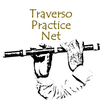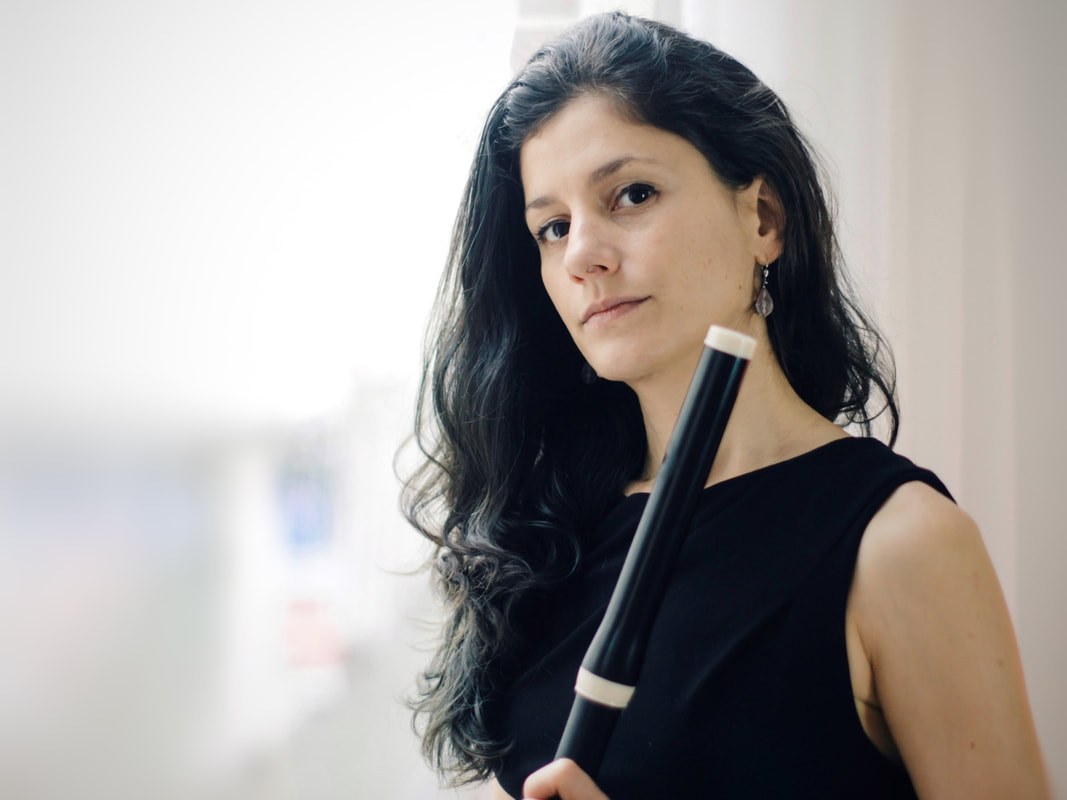interview with
|
|
Florencia is a flute player specialized in historical instruments.
She has collaborated with Amsterdam Baroque Orchestra, Apollo ensemble, Holland Baroque Society, Dutch Baroque, Wrocławska Orkiestra Barokowa, Musica Amphion, La Folia Barockorchester, Orchestra of the Eighteenth Century, and many more. She earned her bachelor and master's Diplomas in early flutes at the Royal Conservatoire in The Hague. As a guest lecturer she has been invited by the Royal Music Association in London, the National University for the Arts of Argentina, the Janáček Academy in Brno, the Fontys Hogeschool voor de Kunsten in Tilburg, and others. In the Royal Conservatoire she teaches courses and clinics about performance, methodology and didactics of early flutes in education, historical development of the flute, and a minor course on traverso. www.florenciagomez.nl Florencia’s Facebook page |
|
The first thing you do when you pick up your traverso to start the practice day, and why?
|
Depending on the level of energy I have when I start the practice, I either start on long notes or do vocalization-type of slurred arpeggios in all tonalities. It reminds me that the flute is a singing instrument and allows me to rediscover what I and the instrument sound like on that day.
|
|
Any recurring piece to play every day, and why?
|
Not really. Usually I work on the repertoire in my performance agenda.
|
|
Do you have a daily routine?
|
The body: if there's time- some work of 'isolation', as dancers call it. A bit of practice for the fingers, a bit for tonguing, a bit for the embouchure. Every time something new, or something slightly varied. Mostly focusing on sensations, alternating internal and external focus, and self perception. There's a great deal of exploration - and fun!!! - in this part of the work.
The language: vocalises, messa di voce, scales and arpeggios with varied articulation, etc. The repertoire: by heart. |
|
What kind of goals do you set for your practice?
|
To cover all items that need regular work, in one practice session. Fingerings, embouchure, support, articulation, intonation. To focus on the process and not on the result.
|
|
Do you do any systematic warm-up?
|
I like vocalises a lot. I usually warm up remembering what I'm preparing for and its challenges, so that keeps it varied and interesting.
|
|
Do you have a specific structure for warm-up and practice sessions?
|
I used to have a list of items to cover that would include things like:
|
|
Any distinctive characteristics of baroque flute daily practice vs. modern flute or other instruments?
|
The baroque flute is an instrument with an extraordinary flexibility and versatility. This allows us to respond with much more “soupplesse” (i.e. flexibility) in ensemble playing, and it demands full mental, emotional and physical presence in the moment. Because it's an organic, ever-changing instrument, the challenges are usually related to attain speed in response, coordination to adjust to intonation changes (we play with other quite unstable instruments in ensembles as well!), and a clear articulation that serves the pieces in every situation and space.
These aspects are present when working with modern instruments as well. However there is a much higher degree of stability in the instrument, that allows the focus to be on other aspects. The musical aesthetics and the repertoire demand different approaches and priorities as well. |
|
What are the key elements and unmissable points of daily practice?
|
I would say a bit of everything: articulation, support, scales, arpeggios, repertoire. Unmissable is especially to make it interesting, fresh and new every time, so that the focus stays on and creativity is not left out. When the mind starts wandering, the work becomes more difficult and slow.
Singing is a mandatory - the most unmissable - part of traverso playing. As difficult as it may be for some of us to love and cultivate our singing voices, it's a part of the work that can't be missed. As the baroque oboe teacher at the Royal Conservatoire would say: if you can sing it, you know how you want to play it. Learning Italian, French and German phonetics is not difficult and it will bring you a long way in owning your vocal repertoire with flute. |
|
How long and distributed should warm-up and practice be?
|
Well that's a lovely question. If my schedule allowed it, I would do two daily sessions of 3 hours, as I have done in the past, out of enthusiasm.
However life is life, and in my experience when there is not so much time, blocks of very focused 20 minutes per activity will do it. So, setting a timer and having the uninterrupted flow of work for that amount of time is enough, with very short breaks in between. It's more important not to miss a day than practicing large amounts of hours sparingly. |
|
Any specific tip to address difficult technical passages during daily practice?
|
Yes, no trial and error in tempo! Start in the slowest speed, the one that allows you to focus in the sensations and to enjoy and understand the difficulty, until you can do it by heart.
If passages are too long, cut them into small pieces that make musical sense and practice them by heart. Change the rhythms. Play around with it as if it were a toy, until you can make it your own. If you practice by heart, you can already check your visual field and posture, which are the things that most of the times are getting in the way between our musical ideas and how we want our bodies to communicate them. If you want your mind-body-emotions to respond and be supple and coordinated, you need to take the best possible care of them. Self-exertion for practice and performance is only effective and sustainable when it's balanced with self-love: go walking in the nature regularly, swim, dance, practice yoga, meditation, ride your bike. Preferably on daily or very regular basis, and especially listening to your own limits: you want to build and maintain condition, not to hurt yourself. It will improve your practice and performance substantially if you take care of yourself like this at least 30' a day. It's not only all those rewards chemicals you get from these activities while doing them, but the memory, coordination, mindset and inspiration boost you get from it! To feed your body awareness: techniques such as Feldenkrais, Eutonia, the work of Matthias Alexander, are very interesting. Combining these with artistic body disciplines such as dance, theater or gesture, enhances every aspect of your stage presence, performance and practice. Read poetry out loud for improving your tonguing, and sing out your arias for your support. |
|
Are there any tools that are particularly useful for practicing?
|
Tuner, metronome and others are all part of a toolbox we all need to have. A recording device and a camera are useful to listen to and see what you are doing.
|
|
Any other general advice, suggestion, tip?
|
Repetition can be very challenging mentally. So, whatever is going to be repeated, always focus on the sensation, what's new, what's unique, what's interesting this time, rather than going for the black-and-white or right-or-wrong approach. Inventing your own practice and creating the exercises you think would bring you farther is a wonderful way to stay interested, inspired, to have fun and to go deeper in your musical identity, the instrument's identity, and the repertoire. Don't push yourself, but rather teach yourself as you would like to be taught. This will create a curiosity and motivation fueled loop of middle and long-term learning that's very personal and satisfying.
|
|
How do you advise your students as far as structuring their daily practice?
|
I mostly teach students who already have their own, solid practice structure. In any case, I add or suggest new elements to suit what we are working on. I do advice to set a timer of max 20 minutes per activity and respect it. Then a short break, can be 2 minutes, and then the next 20 minutes block. The mind starts wandering after that time, and then it's just drifting. If you have time for drifting, it's great!! Enjoy it!! You might end up in a new magic island. But when you have performances, deadlines, etc. time management is crucial.
|
|
Do you suggest or teach a warm-up routine?
|
Vocalises, preludes, etc. Nothing done the same way every day. I prefer the term 'ritornello' instead of 'routine'. A ritornello means something different every time it comes back in the opera, our daily practice benefits from that approach much more than the from the 'routine' approach, which has a sports mentality connotation. Nothing wrong with sports, it's just that the disciplines and the goals are absolutely different. When things are 'routine' it's very difficult for the mind and the heart to stay engaged and inspired, and these are the fuels of art.
|
|
Are there any specific pieces particularly beneficial to be played regularly in daily practice?
|
I like Quantz's Solfeggi very much. On later instruments I'm a huge fan of the genre 'etude'. I find it extraordinary that composers would create pieces - sometimes real gems! - that condense the technical challenges, the identity and possibilities of the instrument at the time, and the musical styles. Berbiguier, Andersen, and other composers have left such gifts for us flutists. I love to think they created these pieces just thinking of us. And sometimes the music is so beautiful I forget I'm 'working on technical aspects'. A real treat!
Every etude will be so friendly as to make the level clear from the beginning for you. Their titles will be 'short etudes' or 'easy etudes' or 'etudes of difficulty'. And you can play them as slow as you want! Quantz's Solfeggi are also quite clear about what you'll be working on. In whatever level you are, you can always download the pieces and give then a try! You'll discover something new for sure. |



